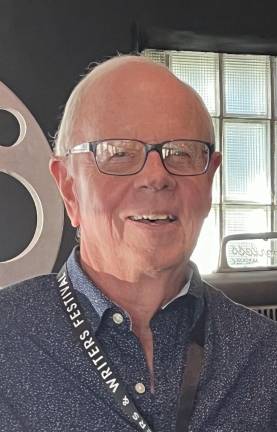USAID dismantling discussed
Milford. The former co-chair of the Milford Readers and Writers Festival addressed the DVA.

Delaware Valley Action (DVA) welcomed Edson Whitney as their speaker on June 11, 2025.
His presentation of the devastation caused by the dismantling of The United States Agency for International Development (USAID) - an agency that has been responsible for administering civilian foreign aid and development assistance - was gripping because he has lived in many countries in Asia and Africa and was part of efforts the agency previously supported.
Whitney grew up in Port Jervis and he and his wife, Barbara, are well-known members of the Milford community who participate in community events. He has served as co-chair of the Milford Readers and Writers Festival since its inception, and only retired this year. Both are people who believe it’s important to give back to others and to the community, and have always acted on those beliefs.
He and Barbara joined the Peace Corps after college and taught English to speakers of other languages around the world. This led to Whitney’s embarking on a 38 year career as a Senior Communications Specialist at the Center for Communication Programs at the Johns Hopkins Bloomberg School of Public Health, primarily funded by USAID. His work included communication strategy design, needs assessment, and managing and implementing national programs in Family Planning, Maternal and Child Health, Adolescent Health, HIV/AIDS prevention and treatment, and developing Risk Communication strategies and training for the prevention and treatment of zoonotic disease (those transmitted from animals to humans).
In addition to having worked in nine Asian countries as well as Jordan, he also had first-hand experiences in Sierra Leone, Eswatini, Ghana, Ethiopia, Guinea, and Zambia. He was well-suited for these missions with his Master’s degree in Development Communication from Cornell University and his soft-spoken, diplomatic approach to dealing with people from other countries and cultures. Whitney and his team worked with ministries of education with the goal of building trust with the locals. They established local clinics in some countries and their campaigns would include sending flyers written in the local language and creating fun local events.
Some of their achievements included family planning and contraceptive education in women to women groups in Bangladesh. They made a significant difference in HIV prevention and the prevalence and acceptance of vaccines. They established men’s groups as well.
In Guinea, they were able to stop an Ebola epidemic. In Sierra Leone, they educated people about how to avoid zoonotic diseases. In Jordan, Whitney’s team promoted healthy lifestyles, developing hand-washing programs and family planning programs. Their efforts were delivered though entertainment and social gatherings to reach the local communities and build trust.
But suddenly it all stopped when the administration pulled the USAID funding. The Johns Hopkins funding stopped. People lost their jobs, but worst of all, “Tens of thousands of deaths have occurred so far and many more are projected in the future without funding for these critical programs,” Whitney said.
People in many of these countries are dying of malaria, tuberculosis, childhood pneumonia, and childhood malnutrition, in addition to deaths from AIDS. Some estimates are as high as 1 million adult and child deaths combined.
The USAID funding was only less than 0.5% of the United States’ total expenditures/budget - and yet, while many of these lives could be saved if funding is restored, there seems to be little hope at the moment.
This is particularly poignant for the Whitneys since they have made many friendships in their travels to these places.
No one really knows what the future will bring, but people can only hope.